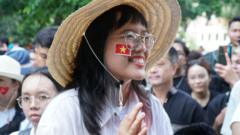In a scorching afternoon in Ho Chi Minh City, twenty-year-old student Tung Linh reflects on a future freed from the shackles of Vietnam's historical conflict with the United States. "My grandparents fought in the war," she shares, "and today we can look at planes in the sky without fear, unlike they did." As Vietnam readies itself to commemorate the 50th anniversary of the fall of Saigon, the landscape of Ho Chi Minh City is a stark contrast to the past, with its rapid economic growth and a burgeoning embrace of capitalism.
Under the Communist Party, Vietnam has adopted practices allowing a thriving economic environment, aiming to position itself as a viable alternative to China for international manufacturing. However, as trade tensions escalate between the US and China, Vietnam's economic ambitions could face significant setbacks. US tariffs have the potential to impose hefty penalties on Vietnam—a looming threat that could cripple its growth.
Historically, Vietnam has been a pawn in the enduring rivalry between superpowers. The scars of its colonial past as a French stronghold and a battlefield of the Cold War still echo, but the country is shifting its focus from the burdens of history to the opportunities of globalization.
With a median age of 33, young Vietnamese are eager for success. Linh, studying economics, dreams of contributing positively to her country, while 18-year-old Minh hopes to become a lawyer. They represent a generation hungry for progress and willing to distance themselves emotionally from the traumatic chapters of history. "We don't hate Americans," Minh asserts, "that was the past. We want to trade with America and learn from them."
Vietnam's recent political maneuvers reflect this ambition—streamlining government operations and reducing bureaucracy to attract foreign investments. Yet, concerns loom as the business environment is impacted by US-China trade disputes. Lisa Wu, a returnee from Taiwan, highlights Vietnam's appeal to Asian electronics companies pivoting from China, though uncertainty persists due to possible shifting trade regulations.
As tightly-knit diplomatic relationships get tested, Vietnam finds itself in the precarious position of needing both the support of the US and the cooperation of China. The country recently extended warm welcomes to Chinese President Xi Jinping, reinforcing its historical ties while simultaneously nurturing aspirations of deeper economic involvement with the West, particularly the US.
Seeking a peaceful and prosperous future, many veterans like Le Thanh Gian, who carry the remnants of the past with them, express a desire for collaborative growth. "We must have peace. We have made great progress," he states, embodying the spirit of a nation ready to turn its back on historical animosities in favor of building bridges towards new alliances and economic opportunities.
As the world watches, Vietnam’s evolving position in the global arena will test its diplomatic prowess in maintaining equilibrium between the US and China while striving for development on its own terms.
Under the Communist Party, Vietnam has adopted practices allowing a thriving economic environment, aiming to position itself as a viable alternative to China for international manufacturing. However, as trade tensions escalate between the US and China, Vietnam's economic ambitions could face significant setbacks. US tariffs have the potential to impose hefty penalties on Vietnam—a looming threat that could cripple its growth.
Historically, Vietnam has been a pawn in the enduring rivalry between superpowers. The scars of its colonial past as a French stronghold and a battlefield of the Cold War still echo, but the country is shifting its focus from the burdens of history to the opportunities of globalization.
With a median age of 33, young Vietnamese are eager for success. Linh, studying economics, dreams of contributing positively to her country, while 18-year-old Minh hopes to become a lawyer. They represent a generation hungry for progress and willing to distance themselves emotionally from the traumatic chapters of history. "We don't hate Americans," Minh asserts, "that was the past. We want to trade with America and learn from them."
Vietnam's recent political maneuvers reflect this ambition—streamlining government operations and reducing bureaucracy to attract foreign investments. Yet, concerns loom as the business environment is impacted by US-China trade disputes. Lisa Wu, a returnee from Taiwan, highlights Vietnam's appeal to Asian electronics companies pivoting from China, though uncertainty persists due to possible shifting trade regulations.
As tightly-knit diplomatic relationships get tested, Vietnam finds itself in the precarious position of needing both the support of the US and the cooperation of China. The country recently extended warm welcomes to Chinese President Xi Jinping, reinforcing its historical ties while simultaneously nurturing aspirations of deeper economic involvement with the West, particularly the US.
Seeking a peaceful and prosperous future, many veterans like Le Thanh Gian, who carry the remnants of the past with them, express a desire for collaborative growth. "We must have peace. We have made great progress," he states, embodying the spirit of a nation ready to turn its back on historical animosities in favor of building bridges towards new alliances and economic opportunities.
As the world watches, Vietnam’s evolving position in the global arena will test its diplomatic prowess in maintaining equilibrium between the US and China while striving for development on its own terms.



















